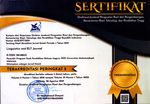Politeness Phenomena in Rempung Language
Abstract
This study aims at identifying the social structures in Rempung Village, elaborating the reflection of social structure in politeness, elaborating the influence of social structure and politeness phenomena toward the lexical levels particularly at behavioral verbs. The data were gathered through observation and interview. The instruments used in doing observation were note taking and recording. Furthermore, the informants are the speakers of Rempung language who reside at RW.01 Derma Bhakti, Rempung. The study found that there are only two social classes exist in Rempung, they are higher-class and lower-class persons. In addition, there are also two language levels in Rempung namely polite and ordinary forms. The social structures influence the use of language in Rempung. Tau jamaq/tau ba’ (the lower-class person) tend to use basa alis (polite form of language) when speaking to tau reaq/tau bo (the higher-class person). It is also used by tau reaq to speak to other tau reaq who have distant relation. On the contrary, tau reaq commonly uses basa jamaq (ordinary form) in speaking to tau jamaq. Basa jamaq is also used by tau jamaq to speak to other tau jamaq, and among tau reaq who have close relation.
Keywords
Full Text:
PDFReferences
Al-Rawi, S.S., Al-Assam D.A.A, 2018. A Pragmatic Study of English Honorific Forms. Journal of the Collage of Language. Accessed on March 25th, 2020 on https://iasj.net
Braun, F., 1986. Terms of Address: Problem of Patterns and Usage in Various Languages and Cultures. Berlin: Mouton De Gruyter
Brown, P., Levinson, S.C., 1987. Politeness: Some Universal in Language Usage. Cambridge: Cambridge University Press.
Eelen, G., 1995. A Critique of Politeness Theory. Cambridge: Cambridge University Press
Fraser, B. 1990. Perspective on Politeness Theories. Journal of Pragmatics 14:219 – 36. http://www.jstor.org
Habibi, H., 2005. The Use of Honorific Words in Kuto Kute Dialect; Style, Varieties, and Setting. Unpublished thesis of Faculty of Teacher Training and Education, the University of Mataram
Holmes, J., 2001. An Introduction to Sociolinguistics: Second Edition. London: Longman Group
Mahsun, 1995. Dialektika Diakronis: Sebuah Pengantar. Yogyakarta: UGM Press
Morand, D. 2000. Language and Power: An Empirical Analysis of Linguistics Strategies Used in Superior-Subordinate Communication. Journal of Organizational Behavior Vol.21. Accessed on March 25th, 2020
Muzianti, Y., 2004. Sistem Pronomina Persona Bahasa Rempung. Unpublished thesis of Faculty of Teacher Training and Education, Mataram University
Soekanto, 1990. Sosiologi Sebuah Pengantar. Jakarta: Raja Grafindo Persada
Thomas, J.A., 1986. The Language of Power. Journal of Pragmatics, http://www.jstor.org
Udin, 1996. Maintaining the Existence of Local Language. Research Report of FKIP Mataram University
Wardaugh, R., Fuller, J.M., 2015. An Introduction to Sociolinguistics: Seventh Edition. West Sussex: Blackwell Publishing
DOI: https://doi.org/10.31764/leltj.v8i1.3082
Refbacks
- There are currently no refbacks.
Copyright (c) 2020 Linguistics and English Language Teaching Journal

This work is licensed under a Creative Commons Attribution-ShareAlike 4.0 International License.
_____________________________________________________
Linguistics and ELT Journal
p-ISSN 2339-2940 | e-ISSN 2614-8633

LELTJ is licensed under a Creative Commons Attribution-ShareAlike 4.0 International License.
_____________________________________________________
LELTJ is abstracting & indexing in the following databases:
_____________________________________________________
LELTJ Editorial Office:













